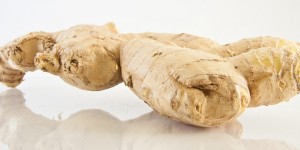Does ginger work as well as prescription drugs for migraines? New research shows that it does.
 Migraines are estimated to affect more than 28 million Americans. These headaches are caused by excessive dilation of blood vessels in the head and are characterized by a throbbing or pounding sharp pain.
Migraines are estimated to affect more than 28 million Americans. These headaches are caused by excessive dilation of blood vessels in the head and are characterized by a throbbing or pounding sharp pain.
There are a number of dietary and supplement strategies that have been shown to be effective alternative treatments for migraines, with success rates often superior to standard therapy. One of the most promising is ginger, which has traditionally been used to ease nausea, relax and soothe the intestinal tract, and help to eliminate intestinal gas. Several double-blind studies have shown that ginger is effective in addressing a range of gastrointestinal issues, particularly nausea and vomiting.
Ginger also has a long history of use as a natural treatment for pain and inflammation. Some clinical studies have supported this use with positive results in people with arthritis, chronic low back pain, painful menstruation, and muscle pain.
Ginger has also been shown to exert a number of anti-inflammatory effects in experimental studies. Early studies in the treatment of migraine headaches were promising, but most were conducted with a combination product containing ginger extract and the herb feverfew.
The Latest Research
One new study compared ginger powder head-to-head with sumatriptan, the generic form of the migraine drug Imitrex. Ginger proved to be equally effective as the prescription medication, but it had a better safety profile than the drug. Minor side effects of Imitrex include nausea, dizziness, drowsiness, and muscle weakness. But it can also cause more serious side effects, including coronary artery spasms, heart attacks, stroke, abnormal heartbeats, and seizures.
A team of neurologists in Iran compared ginger and sumatriptan in 100 men and women who had suffered migraines for an average of seven years. Participants were randomly assigned to either the ginger (250 mg caplet of dried ginger powder) or the sumatriptan (50 mg) group, and neither the participants nor the observers knew which caplets the patient was taking until the study was completed. Patients were instructed to take a caplet as soon as a migraine started.
For each headache that occurred during that month, participants recorded the time the headache began, headache severity before taking the medication, and degree of pain relief at 30, 60, 90, and 120 minutes, as well as 24 hours later. Results showed that ginger was equally as effective as sumatriptan, achieving 90 percent relief within two hours of ingestion. While a very small percentage (4 percent) of the ginger group experienced minor digestive upset, 20 percent of patients taking sumatriptan reported dizziness, drowsiness, or heartburn.
For Fast Relief
The dosage of ginger used in this study was very low (250 mg dried ginger root). Higher dosages more than likely would have produced even better results. Most clinical studies have used a dosage of 1g powdered ginger daily.
Fresh ginger contains active enzymes and higher levels of other active constituents; therefore, it’s possible that fresh ginger may be more powerful than supplements for relieving migraines. The equivalent dosage to supplements would be 10 grams (about one-third of an ounce) of fresh ginger, which is roughly a quarter-inch slice.
The best method to take advantage of fresh ginger is to juice it. Ginger is a great addition to virtually every fresh fruit and vegetable juice. You can also juice or grate fresh ginger and add it to sparkling mineral water to make a delicious homemade ginger ale.
Fresh ginger is a phenomenal and widely available natural medicine. When buying fresh ginger, the bronze root should be fresh looking, with no signs of decay (such as soft spots, mildew, or dry, wrinkled skin). Store fresh ginger in the refrigerator.


